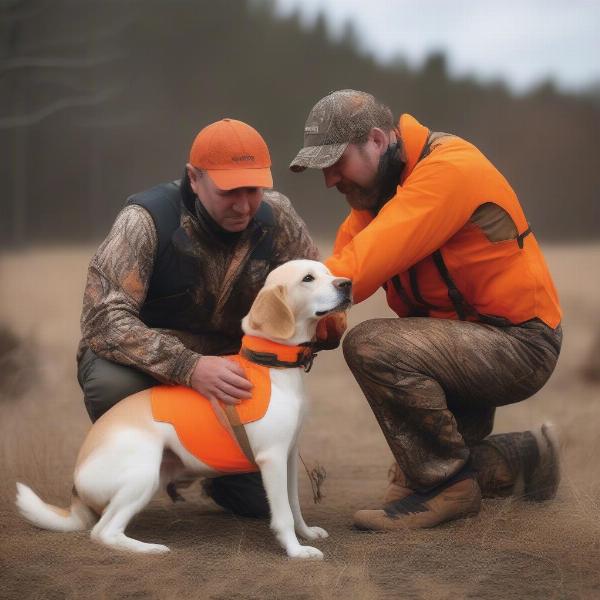Choosing the right collar is crucial for any dog, but even more so for a hunting companion. A hunting dog collar needs to be durable, comfortable, and designed for the specific demands of the field. This guide will help you navigate the world of dog collars for hunting dogs, ensuring you find the perfect fit for your furry partner.
Types of Hunting Dog Collars
Several collar types cater to different hunting styles and dog breeds. Understanding these differences is key to making an informed decision.
Tracking Collars
These collars are essential for hunting dogs that track game over long distances. GPS tracking collars allow you to monitor your dog’s location in real-time, ensuring their safety and helping you retrieve them after the hunt. Some models even offer features like geofencing and activity monitoring.
E-Collars (Electronic Collars)
E-collars, or training collars, can be a valuable tool for reinforcing commands and correcting unwanted behaviors in hunting dogs. They utilize various stimulation levels, from vibration to static correction, allowing for customized training. However, it’s crucial to use e-collars responsibly and humanely, with proper training and guidance.
Beeper Collars
These collars emit a beeping sound that intensifies as the dog gets closer to the game. Beeper collars are particularly helpful in dense vegetation where visual contact is limited. They come in different tone and range settings, allowing you to customize the signal according to your hunting environment.
Traditional Flat Collars
While not specifically designed for hunting, a durable flat collar is still a necessity. It’s a place to attach identification tags and can be used in conjunction with other hunting-specific collars. Opt for a material like nylon or leather that can withstand the rigors of the field.
Choosing the Right Collar: Factors to Consider
Selecting the best hunting dog collar requires considering various factors specific to your dog and your hunting practices.
Dog’s Breed and Size
Larger breeds require more robust collars, while smaller dogs need lighter, more comfortable options. Consider the breed’s specific hunting style and temperament when making your choice.
Hunting Style and Terrain
The type of game you hunt and the terrain you navigate will influence your collar choice. Tracking collars are essential for long-range tracking, while beeper collars are beneficial in dense cover.
Collar Material and Durability
Hunting dog collars should be made from durable, weather-resistant materials like nylon, BioThane, or leather. Ensure the hardware is robust and rust-resistant to withstand harsh conditions.
Comfort and Fit
A comfortable collar is crucial for your dog’s well-being. Ensure the collar fits snugly but not too tight, allowing for two fingers to fit between the collar and your dog’s neck.
 Hunter Checking Dog Collar Fit
Hunter Checking Dog Collar Fit
Maintaining Your Hunting Dog’s Collar
Regular maintenance is crucial for ensuring the longevity and functionality of your dog’s collar. Clean the collar regularly to remove dirt and debris, and inspect it for any signs of wear and tear. Replace the collar if you notice any damage to prevent malfunctions or discomfort for your dog.
Conclusion
Choosing the right dog collars for hunting dogs requires careful consideration of your dog’s breed, hunting style, and the terrain you frequent. By understanding the different types of collars available and the factors influencing your choice, you can ensure your hunting companion is equipped with the best gear for a successful and safe hunt. Investing in a quality collar is an investment in your dog’s comfort, safety, and overall performance in the field.
FAQ
- What is the best collar for a beagle hunting rabbit? A beeper collar can be particularly helpful for beagles hunting rabbits in dense brush.
- Are e-collars safe for hunting dogs? When used responsibly and humanely, e-collars can be a valuable training tool.
- How do I choose the right size collar for my dog? Measure your dog’s neck circumference and add two inches to determine the appropriate collar size.
- What material is best for a hunting dog collar? Durable, weather-resistant materials like nylon, BioThane, and leather are recommended.
- How often should I clean my dog’s hunting collar? Regular cleaning, depending on the hunting environment, is important to maintain hygiene and prevent wear and tear.
- Can I use a regular collar for hunting? While a regular collar is necessary for identification, it’s recommended to use hunting-specific collars for added safety and functionality.
- Where can I buy hunting dog collars? Specialty pet stores and online retailers offer a wide variety of hunting dog collars.
ILM Dog is a leading online resource for dog owners worldwide, providing expert advice on dog breeds, health, training, nutrition, and much more. We offer practical, reliable information to help you care for your canine companion at every stage of life. Whether you’re a seasoned hunter or just starting out, ILM Dog has the resources you need. Contact us at [email protected] or +44 20-3965-8624 for expert guidance on choosing the perfect products and accessories for your hunting dog. Visit us at ILM Dog for more information.